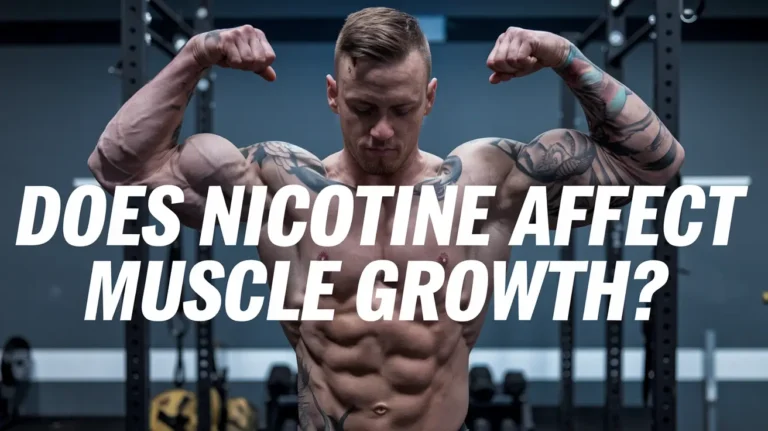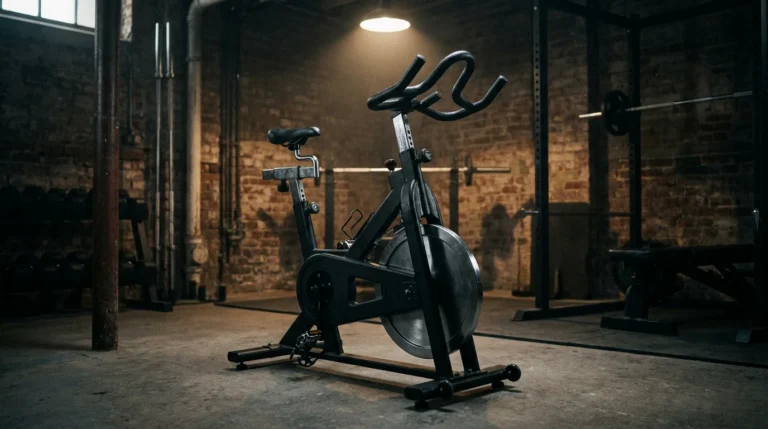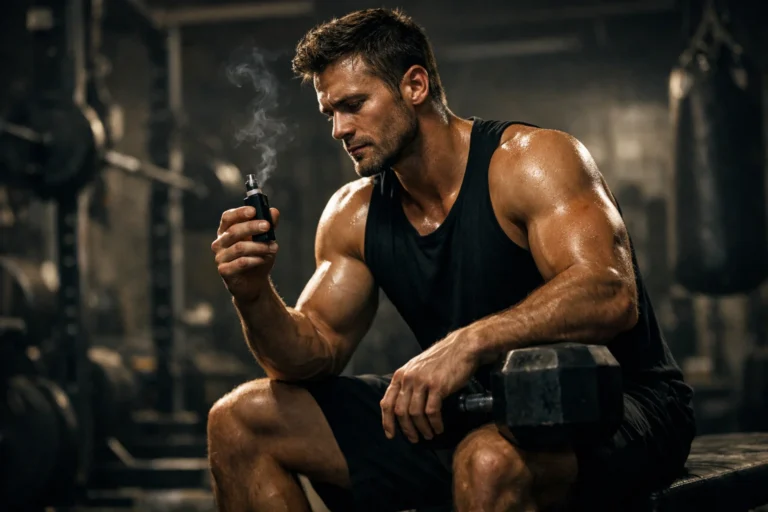Nicotine and muscle growth have been debated and researched a lot. Some studies say nicotine might slow down muscle growth.
But, the full effect is still unclear. Athletes and those into fitness want to know how nicotine affects their muscles and performance.
What does science say about nicotine and muscle building? How can people make smart choices about using it?
This article looks into nicotine’s effects on muscle growth, performance, and health. It aims to give a full view of this interesting topic.
Key Takeaways about Does Nicotine Affect Muscle Growth
- Nicotine might slow down muscle protein making and affect muscle maintenance genes. This could stop muscle growth.
- Some studies say nicotine can boost athletic performance by making the heart work better and increasing blood flow. But, the full effect is still unclear.
- Caffeine is more proven to help with exercise performance, especially in aerobic activities, than nicotine.
- Good ways to grow muscles without nicotine include lifting weights, eating right, and using supplements like creatine.
- Quitting nicotine is hard because of withdrawal symptoms. But, health experts suggest getting help and trying FDA-approved nicotine replacement therapies.
Nicotine & Muscle Growth: Key Insights
Introduction to Nicotine and Muscle Growth
Muscle growth, or hypertrophy, is a complex process. It involves the repair and fusion of damaged muscle fibers. This process is influenced by hormones like testosterone and human growth hormone. Some research suggests nicotine, found in tobacco products, could affect muscle growth in several ways.
Overview of Muscle Growth Process
Muscle growth happens when muscle fibers get damaged from exercise, like strength training. The body then repairs and fuses these fibers, increasing muscle mass. This process is controlled by hormones, signaling pathways, and cellular processes.
Potential Effects of Nicotine on Muscle Growth
Nicotine, the main psychoactive compound in tobacco, has been studied for its impact on muscle growth. Some research suggests nicotine may affect muscle growth in a few ways:
- Disruption of Hormone Levels: Nicotine might change the production or regulation of hormones like testosterone and growth hormone. These hormones are key for muscle growth and maintenance.
- Interference with Protein Synthesis: Nicotine could suppress genes and cellular pathways involved in making new muscle proteins. This would hinder the repair and growth of muscle fibers.
- Increased Muscle Breakdown: Nicotine might lead to more muscle tissue breakdown. This would go against the effects of muscle-building exercises.
The relationship between nicotine and muscle growth is complex. Research in this area is ongoing. While some studies point to negative impacts, the full effects of nicotine on muscle development and athletic performance are still being studied.
“The impact of nicotine on muscle growth and athletic performance is a complex and multifaceted issue that requires further research to fully understand.”
Nicotine’s Impact on Muscle Protein Synthesis
Nicotine, found in tobacco, can hurt the production of proteins needed for fixing and growing muscles. A 2007 study showed that smoking lowers the production of these proteins. It also turns off genes that help keep muscle mass.
Nicotine in tobacco smoke can make muscle breakdown worse. This leads to more inflammation and problems with getting oxygen to muscles. So, nicotine might stop the body from building and keeping muscle mass. This is key for doing well in sports and staying healthy.
Interference with Protein Production for Muscle Repair
A 2017 review said nicotine can mess with muscle protein synthesis. This is how the body makes proteins for fixing and growing muscles. If nicotine stops this process, muscles might not recover or grow after exercise or injury. This could slow down the muscle repair process.
Suppression of Genes Involved in Muscle Maintenance
The 2007 study also found that smoking hurts muscle processes by turning off genes for muscle maintenance. Nicotine might stop the body from keeping muscle mass over time. This could lead to less gene expression and muscle health.
These studies suggest that people wanting to grow muscles and perform better should think about cutting down or quitting nicotine. Nicotine can hurt the body’s ability to make proteins and keep muscles healthy.
“Quitting smoking can reverse the adverse effects of nicotine on muscle growth, according to a 2020 review.”
Nicotine and Muscle Breakdown
Nicotine can hurt muscle growth and cause muscle breakdown, or catabolism. A 2020 review found that cigarette smoke leads to inflammation and issues with oxygen supply to muscles. This can harm muscles. But quitting smoking can reverse these effects on muscle health.
Smoking hurts muscle protein synthesis and boosts genes that cause muscle catabolism. Nicotine makes it hard for the body to fix and keep muscle tissue. It also causes oxidative stress and inflammation, making muscle breakdown worse.
Some studies say nicotine might help during intense exercise by improving focus and endurance. But its long-term effects on muscle health and sports performance are mostly bad.
“Smoking impairs muscle protein synthesis and increases the expression of myostatin and MAFbx in muscles.”
Smoking can make muscles weaker and less functional, which is bad for health. Grip strength is linked to many health issues, like heart and lung problems, and cancer. Keeping muscles strong is key for a long and good life.
The harm nicotine does to muscles can be fixed. Exercise training and smoking cessation can fight inflammation and muscle loss from tobacco smoke. Quitting nicotine and living healthily helps muscle growth and fitness.
Effects of Nicotine on Athletic Performance
The impact of nicotine on athletic performance is not clear-cut. Some studies say nicotine can boost heart rate and blood flow, which might help with exercise. But, a 2017 review pointed out that nicotine only helped a few studies, and we need more research to know its full effects on sports and muscle function.
Influence on Heart Rate and Blood Flow
Many studies have shown nicotine increases heart rate, blood pressure, and blood flow. For example, Masumoto et al. in 1998 found nicotine gum changed brain activity. Šaranović et al. in 2019 looked at how tobacco affects lung function in top athletes.
Conflicting Evidence on Performance Enhancement
Research on nicotine and exercise performance is mixed. Some studies show benefits, while others don’t. Hung et al. in 2021 found nicotine helped archery athletes in simulated games. But, Mündel et al. in 2017 found nicotine gum didn’t improve strength, power, or anaerobic performance in active men. Johnston et al. in 2018 also showed nicotine didn’t affect anaerobic exercise in people who didn’t use nicotine.
“The research on nicotine’s impact on exercise performance is conflicting. Some studies have found positive effects, while others have not.”
So, we’re still unsure about nicotine’s effects on sports performance. We need more studies to understand its good and bad sides.
Comparison with Other Stimulants for Muscle Growth
Nicotine is often seen as a stimulant, but caffeine is better proven to boost exercise performance. A 2020 review showed that caffeine helps with both aerobic and muscle-building exercises. Nicotine’s effects on sports performance are less clear and often mixed. So, those looking to grow muscles might do better with caffeine or other safe supplements than nicotine.
Caffeine and Exercise Performance
Caffeine, a well-studied stimulant, improves exercise performance. It boosts both aerobic and anaerobic exercises, including strength and endurance. Nicotine, on the other hand, has a complex and varied effect on sports performance.
A study looked at nicotine’s impact on exercise. It found nicotine helped with leg strength but didn’t boost jumping ability or anaerobic capacity. It also caused higher heart rates, which could be a risk for the heart.
“Nicotine is believed by athletes to provide performance benefits such as preventing xerostomia, aiding in weight control, improving reaction time, concentration, relaxation, desirable arousal-attention, and enhancing motor abilities, attention, and memory.”
Caffeine, however, consistently improves exercise performance in many types of activities. It works on the brain and helps use fat for energy, which helps with better performance.
Overall, caffeine seems like a safer and more reliable choice for muscle growth and exercise performance than nicotine. More research is needed to understand nicotine‘s complex effects on sports.
Strategies for Muscle Growth without Nicotine
Building muscle mass doesn’t need nicotine. You can use several effective strategies to grow muscles without nicotine’s risks.
Resistance Training Techniques
Consistent resistance training is key for muscle growth. Using supersets and drop sets can help. These methods make muscles work harder, leading to more muscle growth.
Nutrition and Supplementation
Good nutrition is vital for muscle growth. You need enough protein to repair and build muscles. Supplements like creatine also help with muscle growth and exercise performance.
- Eat a balanced diet with lean proteins, complex carbs, and healthy fats.
- Think about adding creatine supplements to boost muscle strength and size.
- Don’t forget to drink plenty of water, as it’s crucial for muscle function and recovery.
“Quitting nicotine can lead to feelings of tension, anxiety, and agitation within the first 24 hours, along with stiff muscles, particularly in the neck and shoulder regions.”
By mixing effective resistance training with a focus on nutrition, you can grow muscles without nicotine’s risks. Remember, be patient and stay consistent for your muscle growth goals.
Quitting Nicotine for Muscle Health
Quitting nicotine is tough, but it’s key for better muscle health and overall health. Nicotine is highly addictive, making quitting hard. People may feel withdrawal symptoms and strong cravings.
Withdrawal Symptoms and Cravings
When you stop using nicotine, you might face withdrawal symptoms, such as:
- Irritability and mood swings
- Difficulty concentrating
- Increased appetite and potential weight gain
- Insomnia and sleep disturbances
- Anxiety and depression
- Restlessness and difficulty relaxing
These symptoms can be tough, but they’re part of quitting. Cravings for nicotine can also happen often. It’s important to have a plan and support to get through this.
Resources and Support for Quitting
There are many resources and support options to help you quit nicotine and boost your muscle health. The Centers for Disease Control and Prevention (CDC) has a lot to offer, including:
- Telephone-based quit lines, where individuals can speak with trained counselors for free
- Text-based programs that provide personalized support and advice
- Smartphone apps that track progress, provide coping strategies, and connect users with a community of others on the quit journey
Healthcare providers, support groups, and online communities also offer great advice and support.
Using these resources and support systems can help you quit nicotine. This can lead to better muscle health and overall wellbeing.
does nicotine affect muscle growth?
Nicotine’s effect on muscle growth is still being studied. Some studies say it can slow down muscle growth. Others suggest it might help with performance.
A 2017 review pointed out we need more studies on nicotine and muscle growth. A 2007 study found smoking can slow muscle growth by reducing important proteins. A 2020 review also talked about how cigarette smoke can cause muscle damage.
But, a 2017 review of 28 studies showed nicotine can increase heart rate, which might help athletes perform better. Another 2020 review mentioned nicotine could improve motor skills, but more research is needed.
“The research on whether nicotine affects muscle growth is inconclusive, with some studies suggesting negative impacts and others indicating potential performance-enhancing effects.”
A 2020 review looked at 11 studies and found caffeine helps with exercise performance, especially in aerobic activities.
Experts say the best way to grow muscles is through regular resistance training and eating enough protein. They also suggest considering creatine supplements. Quitting nicotine is good for muscle health, and the CDC offers help to quit smoking.
In conclusion, nicotine’s effect on muscle growth is complex and not fully understood. Both good and bad effects have been found. We need more research to know how nicotine affects muscle growth and athletic performance.
Nicotine’s Impact on Hormones Relevant to Muscle Growth
Nicotine, found in tobacco products, greatly affects hormones that help muscles grow and develop. It impacts testosterone and cortisol, key hormones for muscle building and upkeep.
Testosterone is vital for muscle growth and upkeep. Studies show nicotine can lower testosterone levels. Research suggests that male smokers often have higher testosterone. Yet, nicotine use, including e-cigarettes and chewing tobacco, can reduce sperm counts and testosterone levels. The exact link between nicotine and testosterone is still being studied.
Nicotine also raises cortisol levels, a stress hormone. High cortisol can break down muscle and slow recovery after exercise. This means chronic nicotine use might make it harder for muscles to grow and recover.
“Nicotine can slow down certain enzymes that help muscles recover and grow after exercise damage.”
Nicotine’s effects on muscle growth are also linked to reduced blood flow and oxygen to muscles, and increased oxidative stress and cell damage. These changes make it harder for muscles to recover and grow.
The research shows nicotine affects hormones like testosterone and cortisol, which are important for muscle growth. It’s crucial to compare nicotine’s effects with other substances or habits that affect these hormones.
Potential Risks and Adverse Effects of Nicotine
Nicotine’s effect on muscle growth is a big concern. But, it’s also important to look at its broader health risks. Nicotine can harm your heart, making it beat faster and your blood pressure go up. It’s also very addictive, leading to tough withdrawal symptoms and cravings.
Recent data shows vaping among young people went from about 1% in 2011 to 21% in 2018. This shows nicotine addiction is growing in the young. Smoking cigarettes over time raises the risk of cancer, COPD, diabetes, heart disease, and problems during pregnancy, among others.
Nicotine’s bad effects aren’t just about physical health. Vapers can’t run as fast as non-smokers and do fewer sit-ups and push-ups. Smoking and vaping can harm lung function, slow lung growth, make the heart race, and cause coughing and shortness of breath.
“Quitting vaping and smoking is challenging, with many individuals requiring multiple techniques and relapses being common.”
It’s hard to quit nicotine, often needing many tries and facing relapses. This shows why avoiding nicotine is key for those aiming to improve their fitness and build muscle.
Nicotine also has other bad effects on the body. It changes your metabolism by boosting serotonin, dopamine, and adrenaline but lowering insulin levels. This might slightly increase diabetes risk. Long-term use of nicotine also raises the chance of gum problems, tooth loss, and infections due to gum recession.
Nicotine’s risks aren’t just for individuals. Some jobs and certain groups, like blue-collar workers and non-white people, have more smoking and exposure to harmful substances. This adds more health risks for them.
Conclusion
Nicotine and muscle growth have a complex relationship. Some studies say nicotine might slow down muscle repair and growth. But, other research suggests it could help with performance. Yet, the science is not clear, and nicotine’s risks, like addiction, are bigger than any possible benefits.
For those wanting to build muscle and get better at sports, trying resistance training, eating right, and using safe supplements like caffeine and creatine might be better than nicotine. Quitting nicotine can also help, leading to more muscle and less belly fat.
Choosing whether to use nicotine or other ways to grow muscles and improve performance should be well thought out. It’s important to think about the risks and benefits. By focusing on health and safety, people can find good ways to meet their fitness goals.
FAQ about Does Nicotine Affect Muscle Growth
Does nicotine affect muscle growth?
Studies on nicotine and muscle growth are not clear-cut. Some say nicotine can hurt muscle growth by affecting protein production and muscle genes. Yet, other findings hint it might boost athletic performance. We need more studies to understand nicotine’s full impact on muscle growth and exercise.
How does nicotine affect the muscle growth process?
Nicotine can mess with proteins needed for muscle repair and growth. It also turns down genes that help keep muscle mass. Plus, it might cause muscle breakdown by causing inflammation and reducing oxygen to muscles.
What are the potential performance-enhancing effects of nicotine?
Nicotine might up heart rate and blood flow, which could help with exercise. But, the proof is thin, and we need more research to know how nicotine affects athletes.
How does nicotine compare to other stimulants for muscle growth?
Caffeine is often seen as a better choice for boosting exercise and muscle building. Nicotine’s effects are less clear and sometimes negative. For muscle growth, safer options like caffeine or creatine might be better than nicotine.
What are effective strategies for building muscle without nicotine?
Using resistance training, like supersets and drop sets, with good nutrition and supplements like creatine can help build muscle. This approach avoids nicotine’s downsides.
How can quitting nicotine help with muscle health?
Quitting nicotine can undo its bad effects on muscle growth and health. The Centers for Disease Control and Prevention (CDC) offers resources and support to help people quit smoking and nicotine use.
How does nicotine affect hormones relevant to muscle growth?
Nicotine lowers testosterone and ups cortisol levels. These changes can make it harder for the body to build and keep muscle.
What are the potential risks and adverse effects of nicotine use?
Nicotine’s use is linked to health risks, like bad heart effects and high addiction potential. This can cause withdrawal and cravings.
Source Links
- https://www.medicalnewstoday.com/articles/does-nicotine-affect-muscle-growth
- https://www.ncbi.nlm.nih.gov/pmc/articles/PMC5684328/
- https://my.klarity.health/nicotine-and-muscle-growth/
- https://www.ncbi.nlm.nih.gov/pmc/articles/PMC9797070/
- https://www.mdpi.com/1422-0067/24/12/10208
- https://www.mdpi.com/1660-4601/19/1/515
- https://nutritionandmetabolism.biomedcentral.com/articles/10.1186/1743-7075-10-71
- https://mdh-laboratories.com/2023/12/23/does-nicotine-have-a-negative-n-impact-on-hypertrophy/
- https://cancercontrol.cancer.gov/sites/default/files/2020-08/m02_4.pdf
- https://www.ncbi.nlm.nih.gov/pmc/articles/PMC7871150/
- https://www.nature.com/articles/s41598-021-91510-x
- https://snusboss.com/nicotine/performance/
- https://www.ncbi.nlm.nih.gov/pmc/articles/PMC8745004/
- https://www.mdpi.com/1660-4601/20/2/1009
- https://my.clevelandclinic.org/health/articles/10643-smoking-and-physical-activity
- https://www.ncbi.nlm.nih.gov/pmc/articles/PMC5236038/
- https://examine.com/supplements/nicotine/
- https://www.phlabs.com/looking-to-maintain-or-build-muscle-put-down-that-cigarette
- https://www.happiesthealth.com/articles/muscle-bone/nicotine-impairs-muscle-growth
- https://www.hfe.co.uk/blog/short-term-consequences-of-cigarette-smoking-on-body-composition-and-muscle-function/
- https://www.myfitfoods.com/Fit-Tips/does-vaping-affect-muscle-growth-or-gains
- https://www.ncbi.nlm.nih.gov/pmc/articles/PMC10791090/
- https://www.linkedin.com/pulse/quitting-smoking-help-build-muscles-health-tuneup
- https://ash.org.uk/resources/view/how-smoking-affects-the-way-you-look
- https://www.healthline.com/health/smoking/nicotine-and-testosterone
- https://casadesante.com/blogs/wellness/does-nicotine-affect-muscle-growth
- https://www.sparkprogram.org/does-nicotine-increase-testosterone/
- https://health.clevelandclinic.org/does-vaping-decrease-athletic-performance
- https://www.haypp.com/uk/nicopedia/snus-and-exercising/
- https://www.cdc.gov/niosh/docs/79-122/default.html








